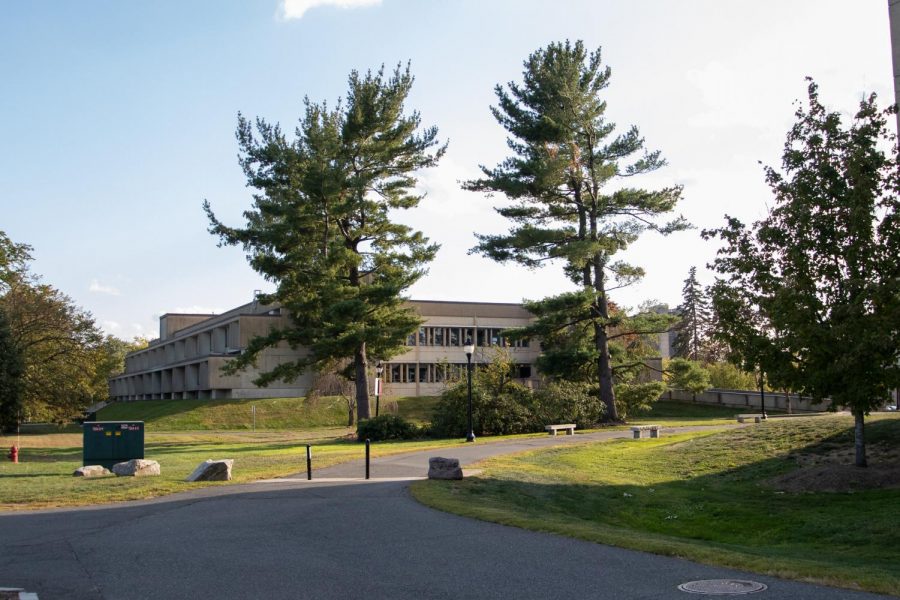Disability Services at the University of Massachusetts presented an event titled “Everyday Ableism: Disability through a Social Justice Lens” on Thursday.
Hosted by Amanda Kraus, Ph.D., the assistant vice president for campus life at the University of Arizona, “Everyday Ableism” informed participants of the history and identification of microaggressions and stereotypes while including them in discussions.
Disability Services explained that Kraus “will lead an interactive presentation aimed at identifying pervasive disability stereotypes and microaggressions. Dr. Kraus will help participants explore how these perspectives inform their personal and professional behaviors and attitudes.”
Kraus began by describing how one should view disability. She presented the prevalent lens, including beliefs that “due to physiological difference or impairment, individual is a deficit” or “access is medical, charity, the law.” Instead, Kraus introduced an emerging lens, where instead “the environment disables people with impairments” and “access is a right.”
She then introduced the audience to her own disability; she uses a wheelchair. Kraus used the emerging lens idea on herself, saying, “I will always have this impairment, and contrary to popular belief, I don’t not want to have this impairment, this is who I am.”
The process of socialization for disabled people is rooted in a “history of oppression,” said Kraus. “So the stereotypes and the biases that we hold for disability and the disability community are rooted in this historical treatment.”
The history of oppression, Kraus noted, has shown that disabled people have been treated in “violent, egregious ways. They’ve been exploited; they’ve been experimented on, sterilized, institutionalized, exterminated.”
Kraus also discussed the implications this has on higher education: “We center the non-disability or the non-disabled experience. And that should be pretty apparent to us. Our classrooms, our dorm rooms, our campus spaces, policies often, practices, really are centered around the dominant experience, in this case the non-disability experience,” she said.
As for the cause, Kraus explained, “I think because of a lack of education, we don’t often learn about disability history. So a lot of what we know about disability I think is stereotypical and biased.”
Kraus then went over both negative and supposed positive descriptions of people with disabilities. In regards to the positives, she noted, “Disabled people are inspirational, heroic, special, resilient, deserving of preferential treatment; so they’re deserving of help, extra attention.” She then gave room for participation, with one audience member noting that it’s “inspiration porn.”
“For those people who do not ‘overcome’ disability, they’re not working hard enough,” the audience member added.
Kraus then explained, “something that’s really important when we think about these positive labels or assessments is like what are we basing it on? And that’s ultimately what I think is the problem, is that we really have very low expectations for disabled folks in society.”
Kraus also led a discussion on common perspectives by the public on disabilities.
She began with what she called “Media Bingo,” including phrases such as “She didn’t let her disability stop her” or “If you saw her [doing anything else], you’d never know she was disabled.” She added that “I’m not being critical of this to say this doesn’t exist; I just think we have to get better at appreciating the range of experiences disabled people have. And please appreciate, or please hear me say, there are people who suffer, there are people who are in pain, there are people who want to walk again, see again, hear again. But not all of us.”
Additionally, Kraus led the group through a series of Today Show stories regarding disabilities, including a story entitled, “Man, 69, with disabilities gets forever home” to which the audience replied with “utterly dehumanizing” and “sounds like an animal”.
She finished the discussion by showing inspirational posts and talking about how it is pervasive microaggressions and defined stereotypes toward people with disabilities.
Finally, Kraus gave a definition of microaggressions.
“The definition is an everyday verbal, non-verbal and environmental slight, snub or insult, intentional or unintentional, which communicate hostile, derogatory or negative messages to disabled people — so in this case disabled people — based solely upon their perceived or actual group membership or disability status.”
She gave a list of ableist microaggressions, including “denial of identity”, “patronization/infantilization” and “second class citizen/burden.” She allowed participants to identify which microaggressions were being used in specific situations that Kraus laid out.
Alex Genovese can be reached at [email protected]. Follow him on Twitter @alex_genovese1.




















